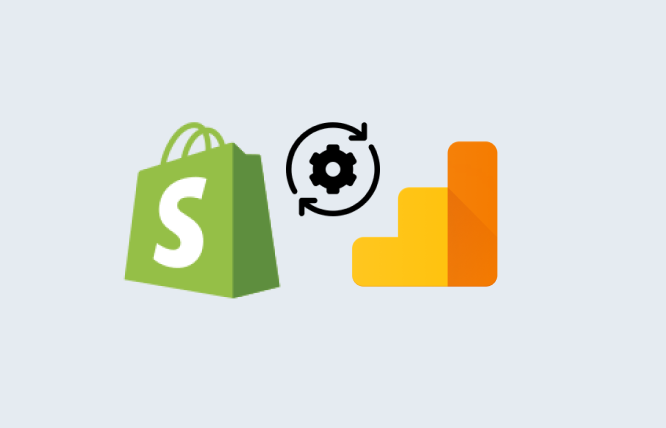Introduction
This blog explores the Shopify GA4 Integration, a potent tool for online businesses. Discover how to access advanced functionalities, customize the customer experience, and utilize data-driven insights to achieve success with your online store.
Staying ahead while following current trends is essential in the constantly changing online shopping era. Well, the key driver for streamlined online shopping is the effective usage of analytics platforms in 2024. It enables you to comprehend your customers, enhance your store’s efficiency, and ultimately increase sales.
Nevertheless, the web analytics industry requires a bit of technical skills. Universal Analytics, which has been the industry standard for a long time, has now been discontinued in July 2023. This signals the need to get our hands on the future: Google Analytics 4 (GA4).
Why Upgrade to GA4 for Your Shopify Store?
GA relies on cookies for tracking. We used to face challenges with cross-device tracking and prioritise tracking sessions. GA4 also gives importance to privacy, follows users effortlessly on different devices, and adopts a customer-focused strategy.
Limitations of Universal Analytics
- Universal Analytics heavily depends on cookies, but their reliability is decreasing because of privacy rules and browser changes.
- Old GA makes it difficult to monitor users on different devices and platforms, resulting in an inadequate understanding of the customer’s journey.
- In e-commerce, understanding user behavior and long-term value is crucial, but Universal Analytics focuses more on sessions which may lead to misunderstandings.
Benefits of GA4 for Shopify Businesses
- GA4 uses machine learning as a base, reducing its dependence on cookies and ensuring its long-term effectiveness.
- It easily tracks user behavior across devices, providing a holistic view of your customer journey.
- You also get to shift the focus from sessions to users, allowing you to understand customer lifetime value, engagement patterns, and purchase behavior.
Integrating Shopify GA4 provides a huge amount of data insights that can be used to enhance your online store and make data-driven choices for sustained success. As a result, this reinforces the groundwork for expansion, enabling e-commerce development agencies to develop even more efficient solutions for your company.
For example, envision a Shopify Plus company utilizing GA4 data to pinpoint a particular product category that excels on mobile devices. This valuable information can guide the creation of a personalised mobile application, improving the customer experience and increasing sales via that platform.
Setting Up Shopify GA4 Integration: A Step-by-Step Guide
Integrating Shopify GA4 unlocks a powerful suite of analytics for your online store. Here’s a straightforward guide to get you started:
Create a Google Account and Google Analytics 4 Property
- If you don’t have one already, create a Google Account.
- Within your Google Account, set up a Google Analytics 4 property.
Add Google Analytics 4 Tags to Shopify (using the Google Channel app)
- In your Shopify admin, navigate to “Sales Channels”.
- Search for and install the “Google Channel” app.
- Once installed, click “Add sales channel” and connect your Google Account.
- During setup, select the GA4 property you want to connect to your Shopify store.
- Click “Connect” to finalize the integration.
Alternatively, Add GA4 Tags Manually (without the Google Channel app)
- In your Shopify admin, go to “Online Store > Preferences”.
- In the “Google Analytics” section, click “Manage pixel here”.
- Click “Connect your Google Account”.
- Choose the GA4 property you want to connect and click “Connect”.
Note: Shopify recommends using the Google Channel app for a simpler integration process. However, it’s better to hire someone to build an e-commerce store and integrate GA4.
Unlocking Advanced Analytics with GA4
Shopify GA4 empowers you to delve deeper into customer behaviour with features specifically designed for e-commerce businesses:
1. Customer Lifetime Value Tracking
Understanding a customer’s total value over time is crucial. GA4 tracks customer journeys across devices, providing a clearer picture of their long-term worth to your store. This data empowers business management solutions providers to develop targeted strategies to retain high-value customers.
2. Cross-Device Tracking
The days of fragmented data are now in the past. GA4 smoothly monitors user actions on computers, smartphones, and tablets, providing a complete perspective of the customer experience. This enables you to recognize patterns and enhance the performance of your store at every interaction point.
3. Enhanced E-commerce Tracking
Shopify GA4 extends further than fundamental purchase monitoring. It records important information such as product returns, items left in carts, and the utilization of coupons. This detailed information enables web and app developers to simplify the checkout process and pinpoint areas for enhancement in the purchasing journey.
4. User Engagement Analysis
GA4 provides valuable insights about user participation. Monitor metrics such as page views, time spent on the site, and scroll depth to gain insight into customer engagement with your store. This information can be used to create personalized mobile applications or business technology solutions that improve user satisfaction and increase sales.
Through the implementation of Shopify ga4 e-commerce tracking, you acquire a strong tool that allows you to make decisions based on data and tap into the complete capabilities of your online store. By utilizing the services of proficient e-commerce development companies that specialise in Shopify GA4 and web development, you can convert customer data into practical insights and attain sustainable success.
Data-Driven Decisions for Your E-commerce Success
The integration of Shopify GA4 is more than just gathering data; it involves converting that data into useful insights that drive the success of your online business. This is how GA4 enables you to make well-informed choices.
1. Identify High-Performing Products and Marketing Channels
Imagine having the capability to identify the specific products that are generating sales and the marketing channels that are drawing in the most valuable customers. GA4 makes this a reality. Analysing purchase behaviour and user acquisition data helps in identifying trends and effectively allocating resources. This enables you to put your money into top-performing products and marketing strategies, increasing your investment returns.
2. Personalize the Customer Experience
Consumers in modern times have a strong desire for tailored experiences. GA4 offers tracking of customer lifetime value, uncovering important information about individual purchasing patterns. This information allows you to customize product suggestions, advertising communications, and website material according to individual customer preferences. For example, a Shopify Plus company can use this information to create a customized shopping experience that encourages customers to return.
3. Optimize Website Conversions
Each interaction on your website reveals a narrative. GA4 monitors user interactions, enabling you to pinpoint potential drop-off points in the customer purchasing process. Web and application developers find this data extremely valuable. They have the ability to utilize it for simplifying the checkout process, improving product pages to boost conversion rates, and recognizing web design elements that could be impacting sales negatively.
4. Make Data-Driven Decisions for Future Growth
GA4 enables you with multiple tracking features to view your online store’s performance. You can track key metrics like customer acquisition cost, customer lifetime value, and streamline marketing campaigns effectively with real-times trackings. This data allows business management solutions providers to develop data-driven strategies for scaling their businesses and achieving long-term success.
Taking Your E-commerce Analytics to the Next Level
Shopify ga4 e-commerce tracking is a powerful first step, but it’s just the beginning. Our e-commerce development company offers a suite of services to bring innovative approached that generate sales:
- Custom GA4 Report Creation and Analysis: Our team can design personalized reports to meet your specific requirements, offering a deeper understanding of how your online store is performing.
- Building Data Dashboards for Real-Time Insights: Thanks to our professionals, they create personalized dashboards that provide updates and enable you to make instant changes.
- Developing Automated Marketing Campaigns Based on GA4 Data: GA4 allows us to design and implement focused marketing strategies using data to target specific customer segments, enhancing the impact of your marketing initiatives.
Conclusion
The integration of Shopify and GA4 provides you with the necessary tools to collect valuable customer data and turn it into useful insights. By using this information, you can improve your online shop, customize the customer journey, and base decisions on data for sustainable expansion.
Keep in mind, that effectively integrating Shopify with GA4 is not something that happens once; it requires continuous effort. Collaborating with a well-established e-commerce development firm like ours guarantees that you will have the knowledge and resources necessary to optimize the value of your data. We provide a wide range of services, from crafting custom reports to running automated marketing campaigns, all aimed at helping you maximize the power of Shopify ga4 e-commerce tracking and succeed in the world of e-commerce in the long run.
Get in touch with us today to talk about your requirements for integrating Shopify with GA4.
Also Read:Hire Someone to build Shopify Store
Frequently Asked Questions
Shopify GA4 integration connects your Shopify store to Google Analytics 4, a powerful analytics platform that provides advanced insights into customer behaviour.
GA4 offers several advantages over Universal Analytics, including a focus on privacy, cross-device tracking, and a customer-centric approach. Universal Analytics is set to sunset in July 2023, making GA4 the future of e-commerce analytics.
Setting up Shopify GA4 integration is a simple process. You’ll need to create a GA4 property in Google Analytics and then connect it to your Shopify store.
Shopify GA4 offers a wealth of features specifically designed for e-commerce businesses, including customer lifetime value tracking, cross-device tracking, enhanced e-commerce tracking, and user engagement analysis. These features can help you identify high-performing products and marketing channels, personalize the customer experience, optimize website conversions, and make data-driven decisions for future growth.
Yes, Shopify Plus agencies can assist you with Shopify GA4 integration. They can help you set up the integration, customize event tags, and analyse your GA4 data to gain valuable insights.
Technology solution services companies can offer a range of services related to Shopify GA4, including custom report creation, building data dashboards, and developing automated marketing campaigns based on GA4 data.
Have questions or feedback?
Get in touch with us and we‘l get back to you and help as soon as we can!




